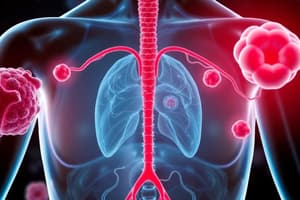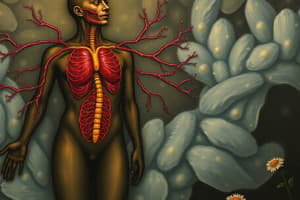Podcast
Questions and Answers
Which of the following statements about endocrine glands is true?
Which of the following statements about endocrine glands is true?
- They have ducts for secretion
- Their secretions are called hormones (correct)
- They provide rapid coordination among organs
- They coordinate physiological functions through nerve fibers
What is the role of hormones in the body?
What is the role of hormones in the body?
- To innervate all cells of the body
- To provide rapid coordination among organs
- To release neurotransmitters into the blood
- To regulate cellular functions continuously (correct)
What is the main difference between neural coordination and hormonal coordination?
What is the main difference between neural coordination and hormonal coordination?
- Neural coordination is carried out by endocrine glands while hormonal coordination is carried out by neural fibers
- Neural coordination provides rapid coordination among organs while hormonal coordination does not
- Neural coordination innervates all cells of the body while hormonal coordination does not
- Neural coordination is short-lived while hormonal coordination is long-lasting (correct)
What is the function of the endocrine system in coordination and regulation?
What is the function of the endocrine system in coordination and regulation?
What is the classical definition of a hormone?
What is the classical definition of a hormone?
Which of the following is a characteristic of endocrine glands?
Which of the following is a characteristic of endocrine glands?
What is the main function of hormones in the body?
What is the main function of hormones in the body?
Which system jointly coordinates and regulates physiological functions in the body?
Which system jointly coordinates and regulates physiological functions in the body?
What is the classical definition of a hormone?
What is the classical definition of a hormone?
Why is a special kind of coordination and integration provided by hormones?
Why is a special kind of coordination and integration provided by hormones?
Flashcards
What are hormones?
What are hormones?
Hormones are chemical messengers produced by endocrine glands and released directly into the bloodstream.
How do endocrine glands release hormones?
How do endocrine glands release hormones?
Endocrine glands release hormones into the bloodstream, unlike exocrine glands which release their secretions through ducts.
Why are hormones important?
Why are hormones important?
Hormones regulate various cellular activities, ensuring proper functioning of the body.
What's the difference between neural and hormonal coordination?
What's the difference between neural and hormonal coordination?
Signup and view all the flashcards
What role does the endocrine system play in homeostasis?
What role does the endocrine system play in homeostasis?
Signup and view all the flashcards
What is the function of hormones?
What is the function of hormones?
Signup and view all the flashcards
What is the endocrine system responsible for?
What is the endocrine system responsible for?
Signup and view all the flashcards
How does the endocrine system regulate body functions?
How does the endocrine system regulate body functions?
Signup and view all the flashcards
Define a hormone.
Define a hormone.
Signup and view all the flashcards
How do hormones contribute to coordination?
How do hormones contribute to coordination?
Signup and view all the flashcards
Study Notes
Endocrine Glands and Hormones
- The endocrine system is responsible for producing and regulating hormones, which are chemical messengers that help coordinate and regulate various physiological functions in the body.
Hormonal Coordination
- Hormones play a crucial role in the body by facilitating communication between different parts of the body to regulate various physiological processes.
- The main difference between neural coordination and hormonal coordination is that neural coordination involves rapid transmission of signals through nerves, whereas hormonal coordination involves the release of hormones into the bloodstream, which then bind to specific receptors to elicit a response.
Endocrine System Functions
- The endocrine system plays a vital role in coordination and regulation by producing and regulating hormones that control various physiological processes, such as growth and development, metabolism, and reproductive functions.
Definition of Hormones
- The classical definition of a hormone is "a chemical substance produced by a gland or organ that is transported through the bloodstream to a target site, where it stimulates a response".
Characteristics of Endocrine Glands
- A characteristic of endocrine glands is that they produce hormones that are secreted directly into the bloodstream, which then transport the hormones to their target sites.
Functions of Hormones
- The main function of hormones in the body is to regulate various physiological processes, such as growth and development, metabolism, and reproductive functions, by facilitating communication between different parts of the body.
Coordination and Regulation
- The nervous system and endocrine system jointly coordinate and regulate physiological functions in the body.
- Hormones provide a special kind of coordination and integration by facilitating communication between different parts of the body, allowing for a coordinated response to various stimuli.
Studying That Suits You
Use AI to generate personalized quizzes and flashcards to suit your learning preferences.




